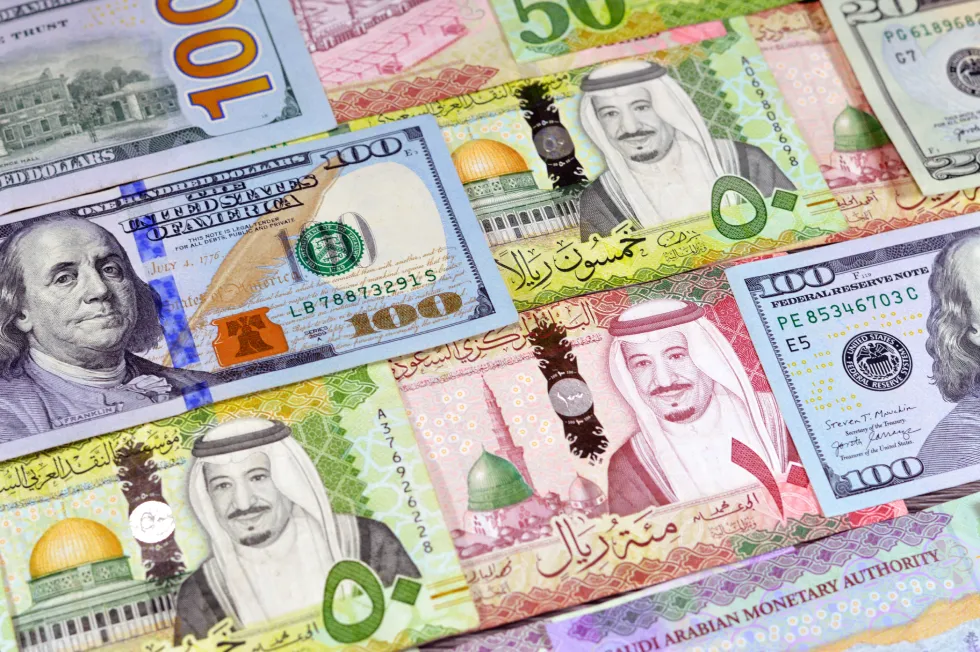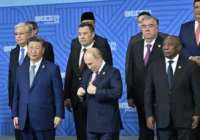As someone with a non-specialist’s interest in how the media covers the great geopolitical question of how the system of payments of the global economy is evolving, I raised the following question to our collaborators.
How significant is this headline from Watcher.guru, which could look to some people like a turning point? “After Pausing BRICS, Saudi Arabia Starts Issuing US Dollar Bonds.”
The article concludes with this: “However, Saudi Arabia has not officially confirmed if it wants to join BRICS or reject the invitation. We have to wait and watch for an official statement from the Kingdom on its decision to join the alliance.”
The fundamentals don’t change, but I’m sure they don’t tell the whole story. Is it even possible even to begin speculating sanely, let alone draw conclusions about which laws produce which effects?
Still, I find nothing astonishing or revealing when I read that “these bonds are solely aimed at institutional investors. The issuance is managed by leading US banks such as Citi, Goldman Sachs, JP Morgan, HSBC, Morgan Stanley, and SNB Capital, among others. Therefore, Saudi Arabia is working closely with the US institutional banks for the dollar-denominated bonds.”
Does this simply reflect the current strong position of the dollar or is it a significant bet on the future?
Edward promptly offered his own strategically ambiguous take on the question of Saudi intentions by posting this photo of Dr. Ali Rashid Al Nuami, Saudi Arabia’s representative at the 10th BRICS Parliamentary Forum in St. Petersburg. He was present, but with something of a scowl on his face (at least at the moment the photo was taken).
Alex contributed a more detailed response that offered much needed clarity without resolving a question that both Saudis and Americans, as Alex explains, prefer to keep shrouded in mystery. Here, on the question of the Saudis’ use of dollars, are what Alex calls his “two cents.”
Saudi Arabia has already $279 billion in government debt outstanding.
The local currency is too small and not fungible in international markets, hence not suited for issuing debt.
Due to oil exports, a large part of revenue is in United States dollars (USD); hence, issuing debt in USD makes sense.
Issuing USD debt also serves as a “hedge” against USD debasement (devaluation). If the USD falls, USD-denominated debt also shrinks (if measured in another currency; the Saudi riyal is pegged to USD, so not much there is reprieve from falling USD if measured in riyal, but you get the idea).
A broader question: Why does Saudi Arabia have to issue debt at all? Saudi Arabia has a current account surplus of 6% of GDP and only a slight government deficit of 2% of GDP. However, this is very much dependent on oil prices. In 1987, for example, when oil prices fell to $8 a barrel, the government had a deficit of 25% of GDP. In 2008, when oil prices reached $140 a barrel, a surplus of 30% resulted. Being an established issuer of debt, with long-standing credit ratings (currently “A”), helps when one is forced to issue debt in times of budget problems.
Saudi Arabia is very aware that the “oil age” will eventually come to an end. Former oil minister Ahmed Zaki Yamani famously said, “The stone age didn’t end for lack of stones,” implying that the oil age will not end for lack of oil. Saudi Arabia is hence trying to diversify away from oil (airline, luxury accommodation, tourism etc).
Saudi Arabia has experienced rapid population growth from 4 million people in 1961 to 34 million last year. In order to prevent locals from revolting against an unelected royal family, they have to be kept happy. Additional government spending can be useful in this regard. Locals already enjoy a personal income tax rate of 0%, while corporate taxes are low, too (20%).
Government spending is also necessary for large purchases of US-made military equipment. Pre-9/11, military spending averaged around $20 billion annually. After 9/11, military spending increased to $60–$90 billion, which can be seen as “protection money” to be paid to the US in exchange for not instigating a palace coup. During his term, US President Donald Trump boasted about the amount of arms sold to Saudi Arabia.
The 2017 detention and torture of 400 of “Saudi’s most powerful people” at the Riyadh Ritz Carlton might have been a counter-coup or simply a shake-down of people who were thought to have excessively enriched themselves to the detriment of the state (estimated $28 to $107 billion were recovered).
The headline is therefore not only wrong (Saudi Arabia didn’t “start” issuing USD bonds), but also wrongly suggest the Saudis were in the BRICS camp.
Each time the Saudis mention the possibility of selling Treasury bonds, the US mentions the “Saudi passports found on the sidewalk in Manhattan” after the 9/11 attacks (in clear terms: “We will tell the American public who really was behind 9/11, instigate a palace coup and have the Yemeni Houthis lob a bunch of rockets into your refineries/oil installations).”
Journalism and the question of context
Everything Alex cites is public information. Vinod Dsouza, the journalist who produced the story for Watcher.guru, obviously had access to that information. He could have put together the data as Alex has done and provided a truly enlightening analysis that takes into account the rich complexity of the trio of actors whose complex relationships are at play: Saudi Arabia, BRICS and the US. But as often in this type of journalism, rather than seeking to stimulate the public’s reflection, Dsouza pushed a simplified message. In this case, as Alex shows, this message was simply wrong.
In fairness, however, to Dsouza, he did make this point in the article: “The move suggests that Saudi Arabia might reject the BRICS invitation as it wants the US dollar to flow into its economy.” But even in that acknowledgement of the fact that Saudi Arabia has not joined BRICS, the message that its hesitation is based on its desire to keep USD flowing “into its economy” is so simplistic as to be wrong. As Alex explains, it isn’t about what the nation “wants,” but the convenience of using the existing components of the international system as works today in the most efficient way.
Watcher.guru describes itself as “a leading source in finance, with a focus on cryptocurrency, Bitcoin, Ethereum, Blockchain, DeFi, and more. Our goal is to build a trusted and influential media platform for a worldwide community involved in rebuilding the current financial state to a decentralized system.”
Perhaps it would be better “trusted” and more “influential” if it offered some authentic analysis, such as Alex has provided in our ongoing dialogue. Instead, Watcher.guru appears content with publishing articles highlighting random observations followed by partial and misleading conclusions. I am not suggesting that the website is spreading disinformation or even misinformation (the less intentional form of dupery). But like much of the press, its journalism appears to privilege simplistic, shocking headlines and facile conclusions over solid insight.
Again, to be fair, the website describes its philosophy thus: “Unlike other news sources, we focus on speed as a main priority. Watcher Guru is known for its speed when it comes to news, thus we publish headline-like alert reports first, as our editorial team works on an article to provide context to those who need it.”
The problem may lie in the understanding of context. Alex has provided multiple elements of context. Dsouza’s article is, at best, minimalist. I highlight this contrast to demonstrate the principle we at Fair Observer are following in our “Crucible of Collaboration.” For any serious question — and most people would acknowledge that Saudi Arabia’s geopolitical alignment is a serioius question — context is more than a few random facts and statistics. Our “crucible” is a place of exchange in which the confrontation of contrasting interpretations can lead to greater clarity.
At Fair Observer, we intend to continue developing our Crucible of Collaboration with “Money Matters…” and extend the principle to other topics in the news. We invite readers with their own insights or interrogations to join and enrich the debate. One of our aims is to help all of us to make sense of the headlines we see elsewhere!
Join the debate
“Money Matters…” is dedicated to developing this discussion and involving all interested parties.
We invite all of you who have something to contribute to send us your reflections at dialogue@fairobserver.com. We will integrate your insights into the ongoing debate. We will publish them as articles or as part of the ongoing dialogue.
*[Fair Observer’s “Crucible of Collaboration” is meant to be a space in which multiple voices can be heard, comparing and contrasting their opinions and insights in the interest of deepening and broadening our understanding of complex topics.]
The views expressed in this article are the author’s own and do not necessarily reflect Fair Observer’s editorial policy.
Support Fair Observer
We rely on your support for our independence, diversity and quality.
For more than 10 years, Fair Observer has been free, fair and independent. No billionaire owns us, no advertisers control us. We are a reader-supported nonprofit. Unlike many other publications, we keep our content free for readers regardless of where they live or whether they can afford to pay. We have no paywalls and no ads.
In the post-truth era of fake news, echo chambers and filter bubbles, we publish a plurality of perspectives from around the world. Anyone can publish with us, but everyone goes through a rigorous editorial process. So, you get fact-checked, well-reasoned content instead of noise.
We publish 2,500+ voices from 90+ countries. We also conduct education and training programs
on subjects ranging from digital media and journalism to writing and critical thinking. This
doesn’t come cheap. Servers, editors, trainers and web developers cost
money.
Please consider supporting us on a regular basis as a recurring donor or a
sustaining member.
Will you support FO’s journalism?
We rely on your support for our independence, diversity and quality.






